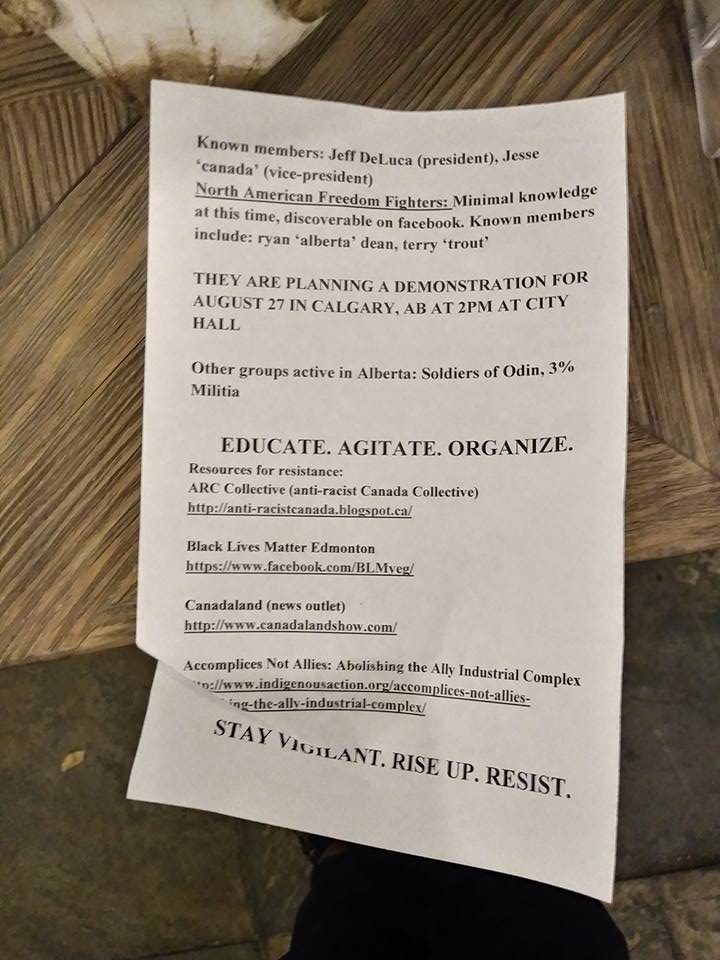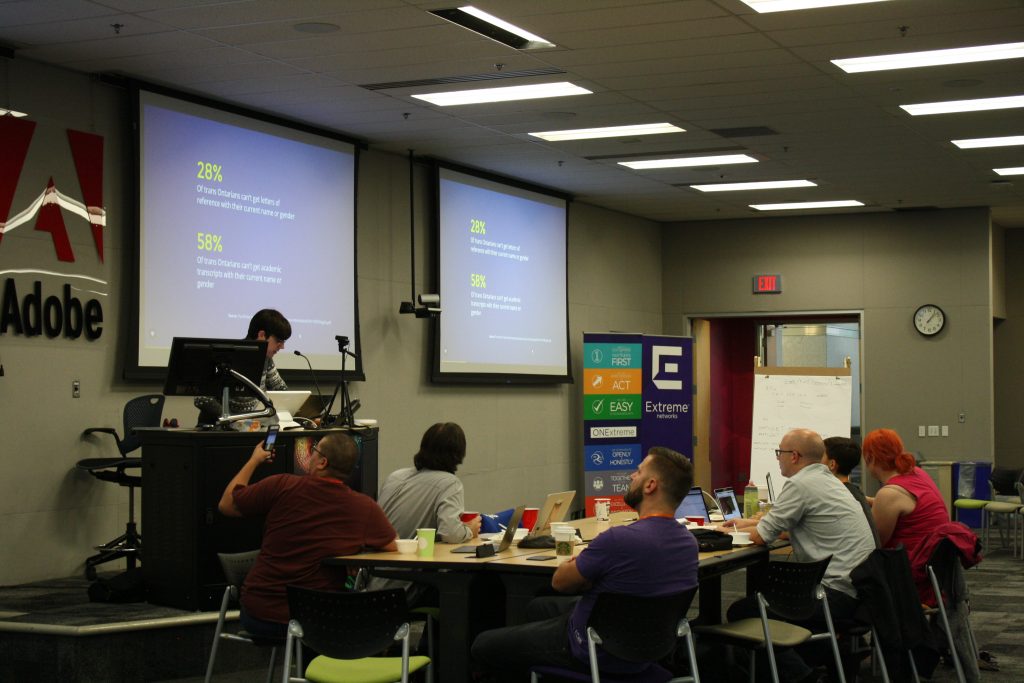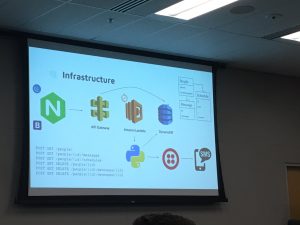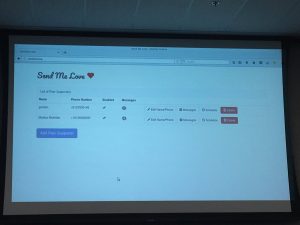I just came back from my road trip across Canada, driving from Ottawa, Ontario to Terrace, British Columbia and then flying to Vancouver. I stayed there for 9 days before then flying back to Ottawa.
It was my dream to drive across Canada, to see the prairies, to camp in British Columbia. I got to do all of that, and it was everything I hoped it would be.

Planning
The trip was the result of my friend Kammy. She was heading to a community far up north in British Columbia to work for the year, and was looking for people to join her on the long drive out. I gave her a tentative yes, provided I went through with leaving my workplace.
Well, I did that. We spent two nights planning, figuring out where we would camp each night and what essentials we needed to bring along.
I was anxious. I had only hung out with Kammy twice outside of church, and didn’t know how it would be to spend 8 days together. What if we irritated each other? What if her music was REALLY bad? What if we had a fight? So we talked about that, and how we would deal. I was also anxious about driving through the states and getting pulled over, and about the vehicle itself: it was a 17 year old SUV that Kammy hadn’t yet acquired. What if it broke down?
Kammy was also anxious. So the two of us water sacs of anxiety drove off for 6,000 km. And you know what? It all turned out great.
 The Trip Out
The Trip Out
First Two Nights
We spent the first night in Toronto. I stayed with my friend Amanda, who I hadn’t seen in years. Kammy stayed with her family. It was lovely to catch up with Amanda; we had tons of magical moments together from her time in Ottawa. Like baking cookies at midnight and going around town hoping to catch art installations. Her life had changed in big ways since then, and it was great to finally see each other.
Then Kammy came around Amanda’s place in the morning, and the two of us headed off. Kammy told me she was nervous. The carriage behind the car, which held four winter tires, started to droop dangerously low from the hitch. We found a hardware store, bought ratchet straps, moved two of the tires inside the already-packed car, and put the carriage into the vertical position. That seemed to do the trick.

We crossed into the US in Sarnia. I was concerned they would pull us over and inspect the contents of the vehicle, which would of added big delays considering how full it was. There was no such problem, though the drive from Toronto had taken longer than anticipated on account of mucking with the carriage.
We drove through Detroit rush hour and drove into Indiana. it started to get dark, and now the rear window for the car wouldn’t close. We were still at least two hours from our $6/night camp site in Illinois, which required parking the SUV in a lot and then hiking for a bit to reach.
I suggested we forget about the camp site, and said that I would get us a hotel room for the night. We could make up the time for the next day, and deal with the window tomorrow, but right now we should just get a good night’s rest. Kammy agreed.
At the hotel parking lot, Kammy discovered a trick to close or open the window. It involved driving over bumps. Good enough. We were in Michigan City, Indiana. I had a good shower, read a bit of A Handful of Time, and crashed.
Third & Fourth Night
The next day we drove through Chicago during morning rush hour. We were both concerned about getting pulled over, and so didn’t go more too much over the speed limit. A Chicago driver that wasn’t pleased with our speed, as it was too slow, gestured, honked, and yelled at us.
We stopped by a Subway for lunch. At this point, we were keeping an eye out for the eclipse. The first total eclipse was hitting North America since 1979, and we were a few hundred kilometres north of those who would get to see the sun completely covered. We almost missed it – it was Kammy who noticed it was happening while we were in the parking lot.
We crossed from Illinois into Wisconsin, and then Minnesota. We camped out at state park by Lake Carlos, which ended up being amazing. The lady at the desk was genuinely happy to see us. The place, like almost all camping spots on our trip, was mostly for RVs. We tried out my BioLite and made ourselves a nice camp fire.

That night was magical. There was a clear sky, and I got to see thousands of stars and the milky way. I had only ever seen the milky way once before. The lake in front of our camping spot was still, and all the stars reflected onto it. Just above the tree line on the other side of the lake, you could see the glow from a nearby town.
As I fell asleep, I heard wolves howl in the distance.
The next day, we drove through North Dakota and crossed into Canada through the small town of Portal. Half of Portal was in North Dakota, the other half in Saskatchewan. We were the only non-commercial vehicle to cross, which resulted in a bit of temporary confusion about which line to go into. We were inspected at two check points by CBSA, and again I feared they would pull us over. They opened doors and went through Kammy’s clothes while we were in line, but didn’t get any issues.
We spent the fourth night at a camp site in Estevan, Saskatchewan. This one was a bit of a disappointment compared to Lake Carlos. We were the only tent there, and the place was clearly intended for RVs. There were electric plugs by our tent. Sites were clearly marked for RVs but not those who were tenting. Still, there were washrooms with flush toilets and showers.
Fifth Night
The fifth day we drove through Saskatchewan, passing Regina and Saskatoon. Whereas Kammy and I, who were chatting about everything from sex to religion to sex plus religion, were noticing all the anti-abortion billboards in the states, we couldn’t help but notice all the bible camp signs in Sasktatchewan. There was also a sign that said PREPARE TO MEET GOD at one point.
It was on this stretch that I finally saw the prairies. There was hints of the flatness in North Dakota, but not like this. It was stunning.

We crossed into Alberta and camped at a place just outside Edmonton. Kammy’s friend, who labelled themselves the Edmonton Tourist Board, recommended a few spots to visit while we were there. They didn’t disappoint.
Edmonton reminded me of Ottawa. I really liked it. We hit up a vegan restaurant, Cafe Mosaics. The food was pretty awesome, and a welcome reprieve from the camp food we had been making. There was also a flyer to protest a white supremacist gathering in Calgary. This was on the heels of the Charleston white supremacist gathering and in which one bigot plowed down those protesting the event with his car.

We then hit up a little hole in the wall that had delicious onion cakes that we saved for the next day.

Sixth Night
The next day, we hit up a nearby provincial park that Edmonton Tourist Board had also recommended. There we ran into a herd of bison. We stopped to take in the view. They were everywhere.

We continued driving. Where once there was flat land, now were mountains. We were in the Canadian Rockies. We passed Jasper, stopping to take a hike along the way and stopping by Mount Robson to take a look.


We entered British Columbia and drove to our camping spot outside of Prince George. That too, proved breathtaking.


Seventh Night
The next day we headed for Terrace. We were going to camp up Kitwanga Mountain, which was free, provided you could get there. Google Maps didn’t show any roads for it, but the BC Parks site had some directions. We had a backup plan of going to a motel in Terrace if none of it worked out.
We drove almost all of the Highway of Tears that day, from Prince George to Terrace. There were posters at gas stations, signs by the road, offering rewards to find women who went missing after being on this highway. A large billboard warned residents not to hitchhike, but what option do you have when you don’t have access to a car?
We arrived at the base of the road that would take us up Kitwanga Mountain. A sign at the bottom cautioned only 4x4s to proceed. We made our way up. 500 meters in, we encountered a tree that had drooped so much it was flush with the road. We decided to drive through it, thinking the car would push it out of the way.
We got stuck on the tree. We got out of the car to inspect. The tree was jammed in there. We stopped to think what we would do. Much like the carriage drooping and the window not closing, we remained calm. We had a bread knife, and so decided to cut down the tree with that.

It worked! We got through the tree, taking turns. The base of the tree almost took Kammy’s leg off as it rebounded. Kammy was able to drive over the tree at this point, and I threw it in the woods.

There were a few more felled logs ahead of us blocking the road. Those Kammy and I moved together. Eventually, we got to a spot we couldn’t drive the SUV further. So we parked it to the side, and hiked the rest of the mountain to the intended turn around spot.
It was likely no one would come that night, as at least three trees blocked the road until our arrival, and those had been there for a while. I was still scared about waking up to a car running us over. We set up camp anyways; it was the only viable clearing that wasn’t a road.
From the turn-around spot, Kammy and I continued up the trail. At one point, I got freaked out. There were cries from what sounded like an elk. That was fine. But then there was a distant, deep, stomping sound from a different direction. My anxiety infected Kammy. We both turned around and went to the camp. I regretted not picking up bear spray in Edmonton at this moment.
It started to rain. We quickly prepared food and put our stuff in a bear hang.

We hit the tent, and the two of us being pretty scared, held each other as we fell asleep.
Departure
The next morning was raining pretty hard. We packed up as quickly as we could and made our way down to the SUV.
Kammy dropped me off at the airport, and after some heart felt goodbyes I boarded the plane to head down to Vancouver.

The plane flew at a low altitude compared to the larger passenger aircraft I was used to, giving me a stunning view of the mountains below.
Kammy and I made excellent travel partners. We both had different taste in music, but both liked some of each other’s stuff. We had tons of really great conversations. We both stayed calm when things went wrong, came up with solutions, and went ahead. All that anxiety in the beginning about what would happen if we didn’t get along seemed a little silly now.
I was also proud of myself for driving through the US. I haven’t driven much in my life, not being a car owner, and having never rented a car. The biggest trip up until this point had been a drive to Toronto as a support vehicle while my best friend walked his way down as part of a fundraiser.
In the end, the trip, including gas, food, and lodging, was under $900 CAD. It took us 7 nights to get there. Best $450 I ever spent.
Vancouver
Jean welcomed me at the airport in Vancouver. I was spending the first night with her. The next day she took me to Boundary Bay.

In the first days I was pretty awful company. A bunch of emotions were coming to the fore, and I was pretty terrible at dealing with them constructively. That started to change the second day.
In my time in Vancouver, Jean showed me some gems. Cheap sushi. Bao buns that were loaded with tasty fillings for less than $2. A beautiful community garden hidden in between industrial buildings that eschewed pesticides for alternating plant types. A Chinese garden with quiet enclaves downtown that was one of the city’s park.

That second night, I also went to my hostel. I had this place for the remainder of my stay in Vancouver. There I met Gauthier from France, Claire from England, as well as a Moroccan fellow whose name escapes me. I breathed a sigh of relief to see they were a bit older; I’d be able to get some sleep tonight.
Claire and I would eventually befriend each other and go up Grouse Mountain, which was accessible from downtown Vancouver by way of a free shuttle. It was stunning.
Meanwhile, I was eating all the sushi I could while in Vancouver. I must have gone every day. Ottawa had nothing this fresh, inexpensive, or generous in portions.
In addition, I got to hang out with other friends while in Vancouver. My friend Emory, who was the reason for my last visit three years ago. My friend Janelle, who I met through church in Ottawa, and had moved there. My cousin, who had also moved there from Ottawa.
They were all generous with their time. Emory took me to a coffee shop and then bowling, and in so doing, introduced me to Commercial Drive, which seemed to be where the queers hung out more so than Davies Street. A person at the coffee shop had a THEY/THEM patch, while the individual they were talking to had a t-shirt promoting the safe injection site. I saw a few of those shirts while in Vancouver; it made me think of Ottawa where the city was fighting safe injection sites.
Janelle made me a beautiful breakfast, and we had a really sweet chat catching up and seeing her incredible house, that she shared with two roommates. My cousin was also a pleasure to hang out with. We went for breakfast after I had gone to church that Sunday, and on the day of my departure, went for ramen together. Both places were joints he really liked; and the food was pretty great.
As my days in Vancouver came to a close, Jean and I hung out more. She took me to parks inside the city and out. We spent one night walking around a park downtown that had a lake and lots of happy dogs running around.

Vancouver was special. Jean was right. As the injection site t-shirt hinted, people were doing more to stand up for others here. The library, which I spent one afternoon at, had explicit signage to indicate trans people were welcome to use washrooms. You didn’t find those in Ottawa; not in any official building, anyways. Even washroom scribbles were about acceptance. There was a self-defence class for trans people here; as well as a trans barber shop where I went and got my hair done!
Everyone I spoke to loved Vancouver, but they all also spoke of how housing and rent was not affordable. The cost of a one bedroom apartment is double what it is in Ottawa. There are no rent controls. There are ridiculously few apartments going around, so its not uncommon to go through interviews to try to get a place, along with however many others hope to rent that same spot. Housing prices are the second most unaffordable in the world, after only Hong Kong.
I did a lot more while in Vancouver – crossing the Lynn Canyon suspension bridge, visiting Granville Island, looking through shops for contemporary indigenous art to bring back, going to the historic (if you’re queer in Canada, anyways) Little Sisters book shop, hiking through Lighthouse Park, etc. I was out doing something all day for every one of those nine days I was there, taking afternoon breaks in my hostel.
Then came time to say goodbye. Jean dropped me off at the airport. I flew home on an overnight flight, though not without first being diverted to Montreal on account of poor visibility in Ottawa. I took a taxi and made my way home.
Back in Ottawa
As the taxi navigated the familiar streets of Ottawa, the city felt a little different to me. It didn’t feel like home as much. Maybe Vancouver wasn’t as alien in terms of feeling home as I thought.
The next day I got to hang out with Joy, and tell her everything about my trip over beers and nachos. It was one hell of an adventure.






































